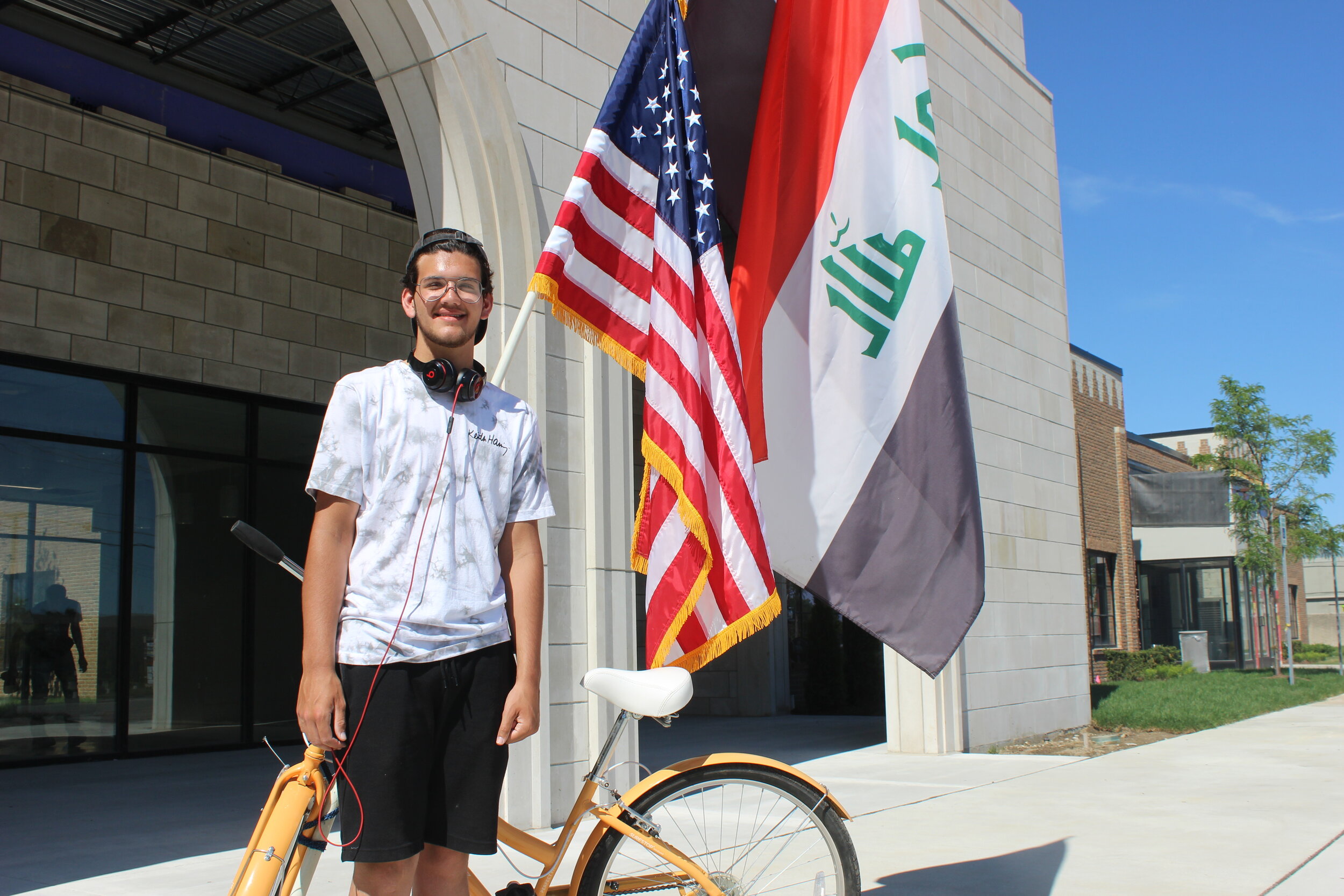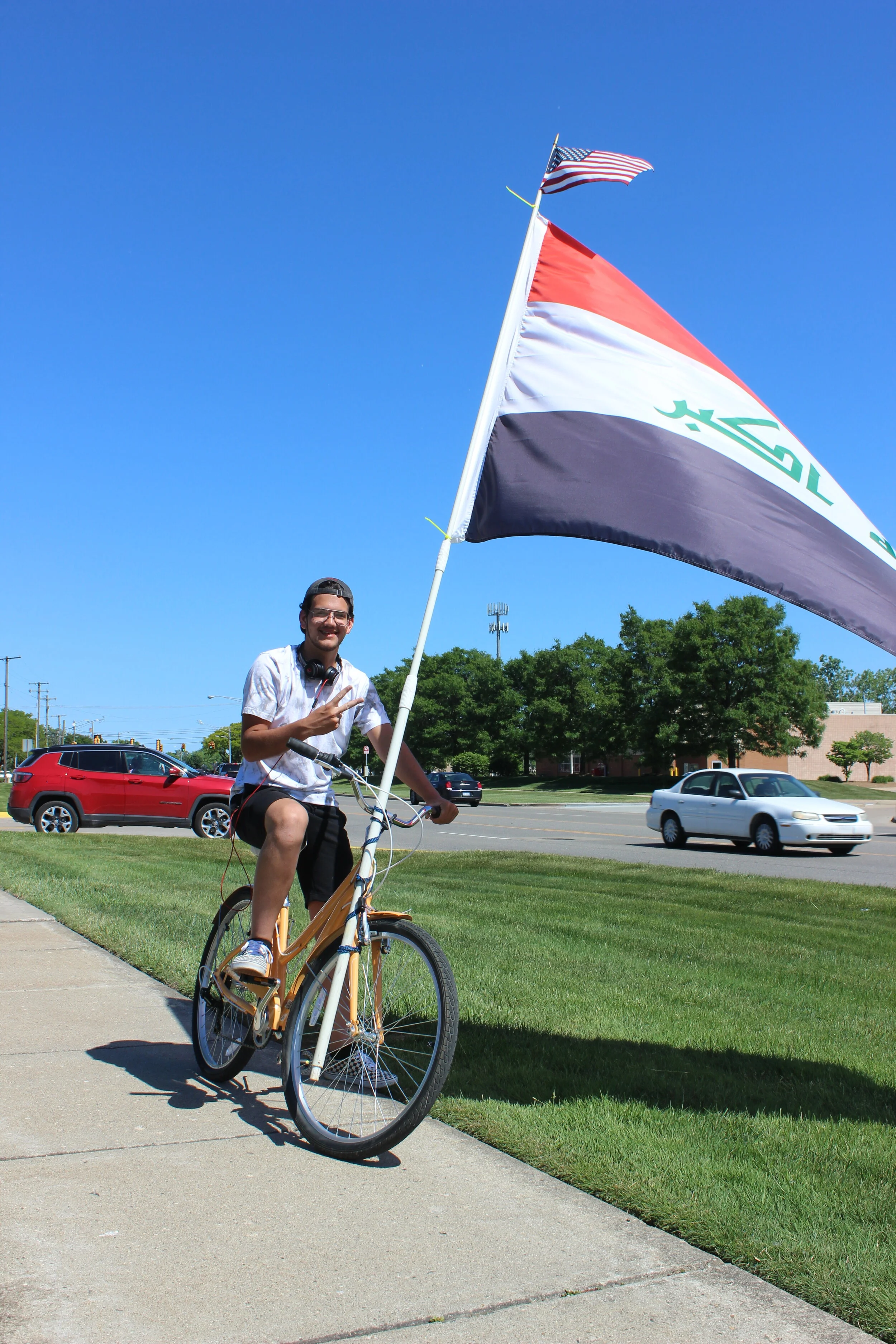Freedom Rider
The Chaldean Flag Kid
By Ruthanne Ashkar
If you live or drive in the Macomb/Oakland County area of Southeast Michigan, chances are you may have encountered young Christian Mansoor weaving his way through traffic on a bicycle adorned with a large Iraqi flag proudly fluttering in the breeze.
Christian, a first-generation American who will be entering 10th grade in the fall, says he first thought of attaching a flag to his bicycle when he was about 12 years old. His original flag wore stars and stripes to display his love for his homeland and support for all who serve in its military.
Eventually Christian’s knowledge of the plight of Chaldeans still suffering in the Middle East inspired him to substitute the national flag of Iraq for its American counterpart. Although Christian was born in the U.S. and is proud to be an American, he feels a strong emotional attachment to the war-torn country where his father was born and then left as an immigrant with his family when he was still a child.
For Christian, his flag-bearing bicycle is not only a show of support for suffering Iraqis, but also a vehicle for increasing awareness of their plight and facilitating important dialogue that serves to educate his fellow Americans about foreign issues not usually covered by mainstream media.
Chaldeans living in the Middle East have experienced several major upheavals in the years since Christian’s grandparents left Iraq to settle in the United States. In order to fully understand what fuels Christian’s passion for their plight, you’d have to be aware of the tumultuous history and turbulent events that have taken place in the country of Iraq during his own short lifetime.
Prior to the U.S. invasion in 2003, Chaldeans living in Iraq had benefited from an amicable relationship with Sunni president Saddam Hussein. The situation became far more tenuous when U.S. President George W. Bush made a conscious decision to ignore U.S. intelligence warnings from the CIA about a guy named Abu Musab al-Zarqawi, a Jordanian criminal who had been radicalized in prison and went on to create a terrorist training camp in Afghanistan.
CIA agents, who had been observing al-Zarqawi’s activities after his release from prison, became alarmed as they saw him begin to assemble an increasingly larger group of jihadis committed to a radical Islamic ideology. In the wake of the 9/11 terrorist attack in New York City, those in charge dismissed the CIA’s concern regarding the potential threat posed by al-Zarqawi and focused instead on going after Saddam Hussein.
Al-Zarqawi saw the Iraq War as the perfect opportunity to make a name for himself by moving his operation to Baghdad ahead of the U.S. invasion, joining al Qaeda and proceeding to orchestrate a series of bombings, beheadings, and attacks that resulted in “turning an insurgency against U.S. troops into a Shia-Sunni civil war.” Unfortunately, Christians and other minorities got caught in the crossfire.
By 2004, the year that Christian Mansoor was born, the ISIS attacks on Iraq’s tiny Christian minority had steadily increased and eventually led to the bombing of five Christian churches in Baghdad and Mosul. The United Nations Refugee Commission announced at the time that Iraqi Christians had begun to flee the country in record numbers.
Some Chaldeans who fled as refugees told stories of having their children kidnapped and held for ransom by gangs of radical Islamists whose reign of terror went unchecked in the lawlessness that followed in the wake of the toppling of Saddam Hussein’s government.
Al-Zarqawi was eventually eliminated in 2006 by joint U.S. Forces but by then the country was in so much chaos that his absence did little to reign in the terrorist activities of his ardent followers who changed their name to the Islamic State (IS) after his death.
In the spring of 2011, when Christian was six years old, the youth in neighboring Syria rose up against the ruling regime during what came to be known as the Arab Spring. By 2013, the year Christian turned nine, militarized IS combatants from Iraq had crossed the border into Syria and changed their name once again, this time to the Islamic State in Iraq and Syria, better known as ISIS. In Syria their numbers continued to grow as online recruiting tactics lured foreign radicals into joining them from a variety of countries including Britain and the United States.
The expansion of ISIS into Syria struck a second blow to Iraqi Christians who had found refuge in Syria after fleeing from persecution in Iraq. Many who had been waiting for the U.S. Embassy in Damascus to issue the visas they had been promised had already seen their hopes dashed when the Embassy was forced to close because of the Syrian revolution. Now they found themselves face to face once again with the militant jihadis who had forced them into leaving Iraq in the first place.
By June of 2014, when Christian was still nine years old, ISIS in Iraq had taken control of one third of the country with leader Abu Bakr al-Baghdadi declaring the creation of an Islamic State in Mosul and naming himself its caliph. The reign of terror that followed included rape, abductions, executions, mass murder, pillaging, extortion, seizure of state resources and smuggling, forcing Iraqi Christians who chosen to stay in northern Syria to flee to Erbil in the south.
About the time young Christian Mansoor decided to attach an Iraqi flag to his bicycle in the U.S., allied forces were already earnestly pursuing the elimination of ISIS in Syria and Iraq. In December of 2017, Iraq’s Prime Minister Haider al-Abadi declared the mission that had begun in 2015 complete.
Since then the nation of Iraq has made slow but steady progress towards reclaiming their ravaged cities and establishing a government that will hopefully do its best to meet the needs of all of its people.
When asked what message he would like to convey to CN readers Christian said he hoped that he would see a time when “all ethnicities are treated equally.”
Although Christian may not understand all of what transpired in Iraq, or the politics involved, he does understand the need for education and dialogue and will continue to exercise his freedom to wave his flag in support of those ideals.


